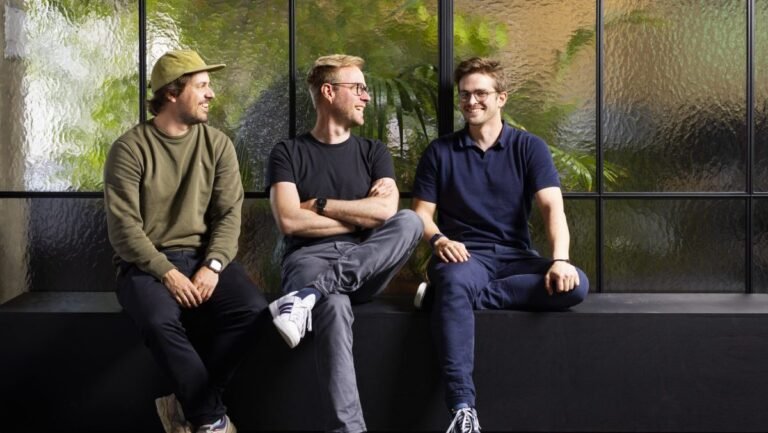
The economy remains on shaky ground in Europe, but there is some silver lining for enterprise startups: those building tools to help businesses run their finances in more steady and predictable ways are seeing a boost to their business.
“We are now poised to take the AccountsIQ product and service to the next level,” said Tony Connolly, founder and CEO of AccountsIQ, in a statement.
Thus, the prosaic accounting startup continues to get attention.
(AccountsIQ and its primary investor for this round, Axiom Equity, are not disclosing its valuation.)
In contrast, Cran says that AccountsIQ positions itself as the platform that businesses will move to as they scale up.

Gorilla, a Belgian company that serves the energy sector with real-time data and analytics for pricing and forecasting, has raised €23 million ($25 million) in a Series B round led by U.S. venture capital firm Headline.
Founded in 2018, Antwerp-based Gorilla works with energy providers across Europe, the U.S. and Australia, including British Gas’ parent Centrica, Shell Energy, and Atlanta, Georgia-based Gas South.
Throw into the mix geopolitical factors such as the Russia-Ukraine conflict, ever-evolving regulations, increasingly distributed energy sources across fossil and renewables, and the increasing use of connected technology, and we now have fertile ground for data-focused energy startups to flourish.
“No one knows what the energy sector will look like 10 years from now,” Gorilla’s co-founder and CEO, Ruben Van den Bossche, said in a statement.
Other participants in the round include the startup’s existing investors Beringea and Belgian private equity firm, PMV.

“So many folks in D.C. don’t actually know what it is,” he remarked.
When Graham put out a call for startup applications, a dozen startups got into YC’s debut class.
Lowe didn’t confirm where that was a strategy on Tan’s part, but he praised Tan for his warmness and his dedication.
After educating the D.C. market, YC aims to leverage its influence, particularly in areas like competition policy.
And if we don’t do that, then it’s pretty easy to see how this plays out,” Lowe said.

While funding for Italian startups has been growing, the country still ranks eighth in Europe by VC investment, according to Dealroom.
Newly created Italian Founders Fund (IFF) hopes to help with the catching up, both in quantity and in quality.
It will use this geographical flexibility to also back Italian founders operating abroad, as well as foreign startups interested in entering the Italian market.
It will also help that some of its LPs are GPs of foreign funds, and that it plans to back Italian founders with global ambitions.
Global Italian startups include Bending Spoons, the owner of popular apps and services like Evernote and Meetup, which is valued at $2.55 billion.

You’re running out of time to join the Startup Battlefield 200, our curated showcase of top startups from around the world and across multiple industries.
This elite cohort — 200 companies strong — absolutely owns (and slays) the exhibition floor at TechCrunch Disrupt.
Tomorrow is the last day to apply to Startup Battlefield 200We’re accepting applications from early-stage startups until tomorrow, June 10 at 11:59 p.m. PDT.
A shot at $100,000: TechCrunch editors will select 20 startups from the SB 200 to be Startup Battlefield finalists.
Apply to the Startup Battlefield 200 right now.

Welcome to Startups Weekly — Haje’s weekly recap of everything you can’t miss from the world of startups.
Image Credits: OdaHardware is hard, episode 234: We already knew that Humane’s Ai Pin launch was going anything but smoothly.
Image Credits: Sword Health / CompanyLive by the sword : Sword Health, an AI-powered virtual physical therapy startup, raised a $30 million primary funding round and a $130 million secondary funding round that brought its valuation to $3 billion.
: Sword Health, an AI-powered virtual physical therapy startup, raised a $30 million primary funding round and a $130 million secondary funding round that brought its valuation to $3 billion.
Where’s your head at: Austrian startup Storyblok raised $80 million to add more AI to its “headless” content management system (CMS) for non-technical people.

With its list of Apple Design Awards winners, Apple is celebrating indie apps and startups over bigger tech firms — including those offering AI chatbots.
There’s no ChatGPT to be found on Apple’s list of Design Awards finalists, for example.
Instead, Apple’s list of finalists for its Design Awards favored small to midsize app makers like Copilot Money, SmartGym, recipe app Crouton, creative app Procreate Dreams, Gentler Streak, and others, as well as those from venture-backed startups like the creativity app Rooms and the reimagined web browser Arc Search.
We're overjoyed– and, frankly, in disbelief– that Rooms is a finalist for Apple's 2024 Design Awards.
An “Inclusivity” section also boosts Apple’s global app community, including members in the EU where regulation is underway via the Digital Markets Act.

Oda, the Norway-based online supermarket delivery startup, has confirmed layoffs of 150 jobs as it drastically scales back its expansion ambitions to focus on just two markets, its homebase and Sweden, the homebase of Mathem, an online grocery that Oda merged with last year.
Online grocery is hard — complex orders with perishable items and a multi-temperature supply chain in a highly price sensitive category,” Oda’s CEO, Chris Poad, wrote on LinkedIn last week (before the layoffs were announced).
Prior to the pandemic, Oda – founded in 2013 – carved out a place for itself as one of the strong regional players in online grocery delivery in Europe.
But by late 2022 Oda was raising $151 million at a valuation of $353 million.
Local publication e24 says Kinnevik and other existing backers Summa Equity and Verdane are expected to provide the bulk of the NOK600 million ($57 million) Oda is reportedly raising.

Google’s newest startup program, announced on Wednesday, aims to bring AI technology to the public sector.
The newly launched “Google for Startups AI Academy: American Infrastructure” will offer participants hands-on training from AI experts and other support for companies solving problems in areas like agriculture, energy, education, public safety, healthcare, telecommunications, transportation, urban development, and more.
Over the course of twelve weeks, startups participating in the equity-free program will be guided by an AI curriculum developed by Google’s People + AI Research (PAIR) team and will participate in advanced sales and go-to-market workshops.
They’ll also be able to access industry connections and, of course, tap into Google’s AI tools as they build.
While much focus is on the AI companies building the models, tools, and interfaces for working with AI, a focus on real-world applications of the technology could impact communities at the local, state, and national levels, Google believes.

TechCrunch Disrupt 2024 in San Francisco is the must-attend event for startup founders aiming to make their mark in the tech world.
Founder benefits: Each founder of the startup can access all Founder Pass benefits.
Here’s what participation offers:Global showcase : Be among the top 200 startups selected from around the globe, spanning multiple industries.
Whether you’re looking to network, learn, or showcase your startup, Disrupt offers the ideal platform to propel your business forward.
Secure your place at TechCrunch Disrupt 2024 and take the next big step in your entrepreneurial journey.













